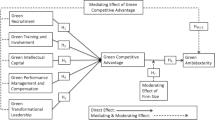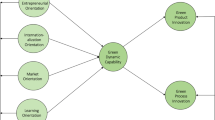Abstract
This study aims to investigate the relationship among green knowledge sharing, green dynamic capabilities, green service innovation, and green competitive advantage. The data were analyzed using descriptive statistics and CFA. The results are as follows: First, the author found that latent variables have good reliability, as well as discriminant and convergent validity. Global model analysis of green knowledge sharing yields acceptable results. Second, according to structural equation modeling analysis, the overall fit measures of the green knowledge sharing model scale passes the threshold standard (χ2 = 810.66, p < .05, GFI = 0.83, RMSEA = 0.094, NFI = 0.87, CFI = 0.90, SRMR = 0.051, NNFI = 0.88, PNFI = 0.76, CN = 101.95, χ2/df = 4.43). Third, the author discovered that green knowledge sharing improves green dynamic capacities, green service innovation, and green competitive advantage. Green dynamic capabilities positively affect green service innovation and green competitive advantage. Furthermore, it was found that green dynamic capacities and green service innovation mediate the positive relationship between green knowledge sharing and green competitive advantage. The results demonstrate that green dynamic capabilities and green service innovation mediates the positive relationships between green knowledge sharing and green competitive advantage. In addition, this study indicates that green service innovation partially mediates the positive relationships between green competitive advantage and its antecedent—green dynamic advantage.


Similar content being viewed by others
References
Abdul-Jalal, H., Toulson, P., Tweed, D.: Knowledge sharing success for sustaining organizational competitive advantage. Procedia Econ. Financ. 7, 150–157 (2013)
Almahamid, S., Awwad, A., McAdams, A.C.: Effects of organizational agility and knowledge sharing on competitive advantage: an empirical study in Jordan. Int. J. Manag. 27(3), 387–404 (2010)
Ansoff, H.: Corporate Strategy. McGraw Hill, New York (1965)
Argote, L., Ingram, P.: Knowledge transfer: a basis for competitive advantage in firms. Organ. Behav. Hum. Decis. Process. 82(1), 155–169 (2000)
Arungai, K. D.: Role of Service Innovation on Competitive Advantage in the Banking Sector in Kenya. Business Administration Strategic Management in the Jomo Kenyatta University of Agriculture and Technology (2015). http://hdl.handle.net/123456789/1871
Barney, J.: Firm resources and sustained competitive advantage. J. Manag. 17, 99–120 (1991)
Barras, R.: Interactive innovation in financial and business services: the vanguard of the service revolution. Res. Policy 19(3), 215–237 (1990)
Barras, R.: Towards a theory of innovation in services. Res. Policy 15(4), 161–173 (1986)
Basu, S., Mir, R., Nassiripour, W.: Dynamic capabilities or positioning: Integrating environmental and resource-led antecedents of firm performance. J. Manag. Mark. Res. 12, 124 (2013)
Bentler, P.M., Bonett, D.G.: Significance tests and goodness of fit in the analysis of covariance structures. Psychol. Bull. 88(3), 588–606 (1980)
Bhat, V.N.: A blueprint for green product development. Ind. Manag. 35(2), 4–7 (1993)
Brotherton, B.: The standardisation versus customisation dilemma in hospitality and tourism. Mark. Intell. Serv. 8, 121–124 (1997)
Carneiro, A.: How does knowledge management influence innovation and competitiveness? J. Knowl. Manag. 4(2), 87–98 (2000)
Chang, C.H., Chen, Y.-S.: Managing green brand equity: the perspective of perceived risk theory. Qual. Quant. 48(3), 1753–1768 (2014)
Chen, J.S., Tsou, H.T.: Information technology adoption for service innovation practices and competitive advantage: the case of financial firms. Inf. Res. 12(3), 314–336 (2007)
Chen, Y.-S., Chang, C.-H., Yeh, S.-L., Cheng, H.-I.: Green shared vision and green creativity: the mediation roles of green mindfulness and green self-efficacy. Qual. Quant. 49(3), 1169–1184 (2015a)
Chen, Y.S., Chang, C.H.: The determinants of green product development performance: green dynamic capabilities, green transformational leadership, and green creativity. J. Bus. Ethics 116(1), 107–119 (2013a)
Chen, Y.-S., Chang, K.-C.: The nonlinear effect of green innovation on the corporate competitive advantage. Qual. Quant. 47(1), 271–286 (2013b)
Chen, Y.S., Lai, S.B., Wen, C.T.: The influence of green innovation performance on corporate advantage in Taiwan. J. Bus. Ethics 67, 331–339 (2006)
Chen, Y.-S., Lin, M-Ji J., and Chang, K.-C.: The positive effects of relationship learning and absorptive capacity on innovation performance and competitive advantage in industrial markets”. Ind. Mark. Manag. 38(2), 152–158 (2009).
Chen, Y.-S., Lin, C.-L., Chang, C.-H.: The influence of greenwash on green word-of-mouth (green WOM): the mediation effects of green perceived quality and green satisfaction. Qual. Quant. 48(5), 2411–2425 (2014)
Chen, Y.-S., Lin, Y.-H., Lin, C.-Y., Chang, C.-W.: Enhancing green absorptive capacity, green dynamic capacities and green service innovation to improve firm performance: an analysis of structural equation modeling (SEM). Sustainability 7, 15674–15692 (2015b)
Chen, Y.S.: The drivers of green brand equity: green brand image, green satisfaction, and green trust. J. Bus. Ethics 93(2), 307–319 (2010)
Chen, Y.S.: The positive effect of green intellectual capital on competitive advantages of firms. J. Bus. Ethics 77, 271–286 (2008)
Chennamaneni, A., Teng, J.T.: Determinants of Knowledge Sharing Behaviors: Developing and Testing an Integrated Theoretical Model. The University of Texas, Arlington (2006)
Coyne, K.: Sustainable competitive advantage: what it is what it isn’t. Bus. Horiz. 29, 54–61 (1986)
Danskin, P., Englis, B.G., Solomon, M.R., Goldsmith, M., Davey, J.: Knowledge management, the value chain and competitive advantage: Lessons from the textile industry. J. Knowl. Manag. 9(2), 91–102 (2005)
Darroch, J.: Knowledge management, innovation and firm performance. J. Knowl. Manag. 9(3), 101–215 (2005)
Davenport, T.H., Short, J.E.: The new industrial engineering: information technology and business process redesign. Sloan Manag. Rev. 31(4), 11–27 (1990)
De Vries, R.E., van den Hooff, B., de Ridder, J.A.: Explaining knowledge sharing: the role of team communication styles, job satisfaction, and performance beliefs. Commun. Res. 33(2), 115–135 (2006)
Den Hertog, P.: Knowledge-Intensive Business Services as Co-Producers of Innovation. Int. J. Innov. Manag. 4(4), 491–528 (2000)
Den Hertog, P., van der Aa, W., de Jong, M.W.D.: Capabilities for managing service innovation: towards a conceptual framework. J. Serv. Manag. 21(4), 490–514 (2010)
Drucker, P.F.: The Age of Discontinuity: Guidelines to Our Changing Society. Harper and Row, New York (1969)
Eisenhardt, K.M., Martin, J.A.: Dynamic capabilities: what are they? Strateg. Manag. J. 21(10–11), 1105–1121 (2000)
Fornell, C., Larcker, D.F.: Evaluating structural equation models with unobservable variables and measurement error. J. Mark. Res. 18, 39–51 (1981)
Gadrey, J., Gallouj, F., Weinstein, O.: New modes of innovation: how services benefit industry. Int. J. Serv. Ind. Manag. 6(3), 4–16 (1995)
Garud, R., Kumaraswamy, A.: Vicious and Virtuous Circles in the Management of Knowledge: The Case of Infosys Technologies. MIS Q. 29(1), 9–33 (2005)
Gold, A.H., Malhotra, A., Segars, A.H.: Knowledge management: an organizational capabilities perspective. J. Manag. Inf. Syst. 18(1), 185–214 (2001)
Hair, J.F., Anderson, R.E., Tatham, R.L., Black, W.C.: Multivariate Data Analysis, 5th edn. Prentice-Hall, Upper Saddle River (1998)
Hamel, G., Prahalad, C.K.: Strategic intent. Harv. Bus. Rev. 67(3), 63–76 (1989)
Hart, S.L.: A natural-resource-based view of the firm. Acad. Manag. Rev. 20(4), 986–1014 (1995)
Helfat, C.E., Finkelstein, S., Mitchell, W., Peteraf, M., Singh, H., Teece, D., Winter, S.G.: Dynamic Capabilities: Understanding Strategic Change in Organizations. Blackwell, Malden (2007)
Hofer, C., Schendel, D.: Strategy Formulation: Analytical Concepts. West Publishing Co, St. Paul (1978)
Kalafatis, S.P., East, R., Pollard, M., Tsogas, M.H.: Green marketing and Ajzen’s theory of planned behaviour: a cross-market examination. J. Consum. Mark. 16(5), 441–460 (1999)
Kamaşak, R., Bulutlar, F.: The influence of knowledge sharing on innovation. Eur. Bus. Rev. 22(3), 306–317 (2010)
Klassen, R.D., Whybark, D.C.: The impact of environmental technologies on manufacturing performance. Acad. Manag. J. 42(6), 599–615 (1999)
Klein, L.R.: Evaluating the potential of interactive media through a new lens: Search versus experience goods. J. Bus. Res. 41(3), 195–213 (1998)
Koenig, H.G.: Religion, spirituality, and health: the research and clinical implications. Int. Sch. Res. Not. (2012). doi:10.5402/2012/278730
Lane, P.J., Koka, B.R., Pathak, S.: The reification of absorptive capacity: a critical review and rejuvenation of the construct. Acad. Manag. Rev. 31(4), 833–863 (2006)
Laroche, M., Bergeron, J., Barbaro-Forleo, G.: Targeting consumers who are willing to pay more for environmentally friendly products. J. Consum. Mark. 18(6), 503–520 (2001)
Liebowitz, J.: Bridging the knowledge and skills gap: tapping federal retirees. Public Pers. Manag. 33(4), 421–448 (2004)
Makower, J.: Strategies for the Green Economy: Opportunities and Challenges in the New World of Business. McGraw-Hill, New York (2009)
Massey, A.P., Montoya-Weiss, M.M., O’driscoll, T.M.: Knowledge management in pursuit of performance: insights from Nortel Networks. MIS Q. 26(3), 269–289 (2002)
Mehrabani, S.E., Shajari, M.: Knowledge management and innovation capacity. J. Manag. Res. 4(2), 164–177 (2012)
Miles, I.: Services in the new industrial economy. Futures 25(6), 653–672 (1993)
Nelson, R.R., Winter, S.G.: An evolutionary theory of economic change. Belknap Press/Harvard University Press, Cambridge (1982)
Njuki, H.M., Okoth, O.N., Mutua, M.W., Mwangómbe, C.W.: Analysis of information and communication technology on service innovation and competitive advantage: a case of commercial banks in Kenya. Eur. J. Bus. Manag. 5(17), 1–8 (2013)
Noci, G., Verganti, R.: Managing ‘green’ product innovation in small firms. R&D Manag. 29(1), 3–15 (1999)
Norman, D.A.: Emotional Design: Why We Love (or Hate) Everyday Things. Basic Books, New York (2004)
Pfeffer, J., Salancik, G.R.: The External Control of Organizations: A Resource Dependence Perspective. Harper & Row, New York (1978)
Porter, M.E., van der Linde, C.: Green and competitive. Harv. Bus. Rev. 73(5), 120–134 (1995)
Porter, M.E.: Competitive Advantage. The Free Press, New York (1985)
Porter, M.E.: Competitive Strategy. Free Press, New York (1980)
Porter, M.E.: What is Strategy. Harv. Bus. Rev. 74(6), 61–78 (1996)
Pujari, D., Wright, G.H., Peattie, K.: Green and competitive: influences on environmental new product development performance. J. Bus. Res. 56, 657–671 (2003)
Robbins, S.P., Judge, T.A.: Organizational Behavior. Pearson/Prentice Hall, Upper Saddle River (2007)
Schmidheiny, S.: Changing Course: A Global Business Perspective on Development and the Environment. MIT Press, Cambridge (1992)
Seyal, A.H., Rahman, M.N.A., Rahim, M.M.: Determinants of academic use of the internet: a structural equation model. Behav. Inf. Technol. 21(1), 71–86 (2002)
Shea, J.: Instrument relevance in multivariate linear models: a simple measure. Rev. Econ. Stat. 79(2), 348–352 (1997)
Shrivastava, P.: Environmental …. Strateg. Manag. J. 16, 183–201 (1995)
Skinnarland, K.I.T., Sharp, P.J.: Knowledge sharing (KS), organizational learning and competitive advantage—a Scandanavian Hotel Company. In: Proceedings of Organizational Learning and Knowledge Conference, Hull University Business School, p. 101. University of Hull, Hull (2011)
Stuart, F.I., Tax, S.: Toward an integrative approach to designing service experiences: lessons learned from the theatre. J. Oper. Manag. 22, 609–627 (2004)
Sundbo, J.: Modulization of Service Production and a thesis of convergence between service and manufacturing organizations. Scand. J. Manag. 10(3), 245–266 (1994)
Taylor, R.M.: Steps on the path of knowledge. Aust. Libr. J. 49(2), 139–151 (2000)
Teece, D.J., Pisano, G., Shuen, A.: Dynamic capabilities and strategic management. Strateg. Manag. J. 18(7), 509–533 (1997)
Teece, D.J.: Explicating dynamic capabilities: the nature and microfoundations of (sustainable) enterprise performance. Strateg. Manag. J. 28(13), 1319–1350 (2007). doi:10.1002/smj.640
Teece, D.J.: Profiting from technological innovation: implications for integration, collaboration, licensing and public policy. Res. Policy 15(6), 285–305 (1986)
Tully, S.M., Winer, R.S.: The role of the beneficiary in willingness to pay for socially responsible products: a meta-analysis. J. Retail. 90(2), 255–274 (2014)
Uhlaner, L., van Stel, A., Meijaard, J., Folkeringa, M.: The relationship between knowledge management, innovation and firm performance: evidence from Dutch SMEs. Sci. Anal. Entrep. SMEs, 1–26 (2007)
Wastyn, A., Czarnitzki, D. (2009) Does professional knowledge management improve innovation performance at the firm level? ZEW Discussion Paper Centre for European Economic Research, pp. 9–67 (2009)
Zahra, S.A., Neubaum, D.O., Huse, M.: Entrepreneurship in medium-size companies: exploring the effects of ownership and governance system. J. Manag. 26(5), 947–976 (2000)
Zaltman, G., Duncan, R., Holbek, J.: Innovations and Organizations. John Wiley, New York (1973)
Zieba, M.: Knowledge Intensive Business Services (KIBS) and Their Role in the Knowledge-Based Economy. In: Proceedings of the 14th European Conference on Knowledge Management, Kaunas, pp. 785–792. Academic Conferences and Publishing International Limited, UK (2013)
Author information
Authors and Affiliations
Corresponding author
Rights and permissions
About this article
Cite this article
Lin, YH., Chen, YS. Determinants of green competitive advantage: the roles of green knowledge sharing, green dynamic capabilities, and green service innovation. Qual Quant 51, 1663–1685 (2017). https://doi.org/10.1007/s11135-016-0358-6
Published:
Issue Date:
DOI: https://doi.org/10.1007/s11135-016-0358-6




